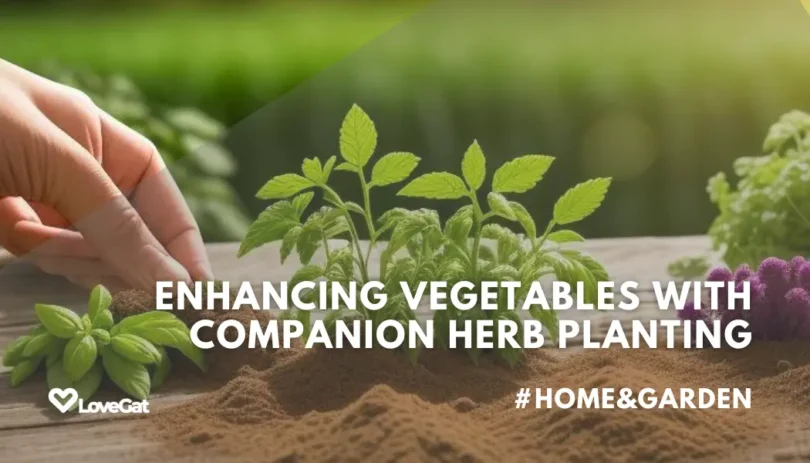Exploring the Benefits of Companion Planting Herbs Alongside Vegetables!
In the realm of gardening, companion planting has emerged as a popular strategy for maximizing yields, deterring pests, and promoting overall plant health. While the concept traditionally involves pairing specific vegetables together, integrating herbs into the mix can offer a myriad of benefits. In this article, we’ll delve into the advantages of companion planting herbs alongside vegetables and explore how this holistic approach can enhance your garden’s productivity and biodiversity.
Understanding Companion Planting
Companion planting is a gardening technique based on the concept of symbiotic relationships between different plant species. By strategically placing compatible plants together, gardeners aim to create synergistic interactions that benefit both crops. Companion planting can help repel pests, attract beneficial insects, improve soil health, and enhance overall crop growth and yield.
The Role of Herbs in Companion Planting
While companion planting has long been associated with vegetables, herbs play an equally important role in this gardening strategy. Herbs are prized for their aromatic properties, culinary uses, and natural pest-repellent qualities, making them valuable additions to any garden ecosystem. When strategically paired with vegetables, herbs can offer a range of benefits, from repelling pests to enhancing flavor and nutrient uptake.
Benefits of Companion Planting Herbs with Vegetables
Natural Pest Control
One of the primary benefits of companion planting herbs alongside vegetables is natural pest control. Many herbs, such as basil, thyme, and rosemary, emit strong aromas that repel common garden pests like aphids, beetles, and cabbage worms. By interplanting herbs with susceptible vegetables, you can create a natural barrier that deters pests without the need for chemical pesticides.
Improved Flavor and Growth
Herbs are renowned for their ability to enhance the flavor of dishes when used in cooking. Similarly, when planted alongside vegetables, herbs can impart their aromatic qualities, resulting in tastier and more flavorful produce. Additionally, some herbs, such as chamomile and yarrow, are known to improve the overall health and vigor of neighboring plants, leading to increased growth and yield.
Biodiversity and Habitat Creation
Companion planting herbs with vegetables promotes biodiversity and habitat creation in the garden. Herbs attract beneficial insects like bees, butterflies, and predatory insects, which help pollinate crops and control pest populations. By creating a diverse and ecologically balanced garden ecosystem, companion planting supports the health and resilience of both plants and beneficial wildlife.
Practical Tips for Companion Planting Herbs and Vegetables
Selecting Compatible Pairings
When planning your garden layout, consider the specific needs and characteristics of both herbs and vegetables. Choose herb varieties that complement the growth habits and soil requirements of your selected vegetables. For example, tall herbs like dill or fennel can provide shade and support for sprawling crops like tomatoes or cucumbers.
Incorporating Succession Planting
To maximize space and extend the growing season, incorporate succession planting techniques into your companion planting strategy. Plant fast-growing herbs like cilantro or parsley alongside early-season vegetables, then replace them with heat-loving herbs like basil or sage as temperatures rise. This ensures a continuous supply of fresh herbs throughout the growing season.
Practicing Crop Rotation
To prevent soil depletion and reduce the risk of pest and disease buildup, practice crop rotation in your garden beds. Rotate herb and vegetable crops annually to different areas of the garden to disrupt pest cycles and replenish soil nutrients. This helps maintain soil fertility and overall garden health over time.
Companion planting herbs alongside vegetables offers a multitude of benefits for both plants and gardeners alike. From natural pest control to improved flavor and biodiversity, integrating herbs into your vegetable garden can enhance productivity, promote ecological balance, and create a more resilient and sustainable growing environment. So, consider harnessing the power of companion planting and discover the synergistic relationships that await in your garden.
You Might Also Like
- How I used AI to create a living data visualization for our home
- 20 Cool Home Decor And Designs For Any Style
- Planning a garden? Here’s a step-by-step guide to start off on the right foot
Social Media Communities
Share your digital nomad experiences and connect with fellow Us:
- Instagram: @Lovegatofficial
- Facebook: @LoveGat
Your journey doesn’t end here. Continue to explore and share our Decor & Home Posts.







